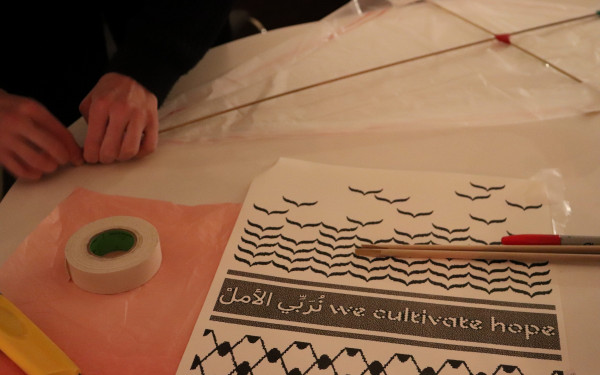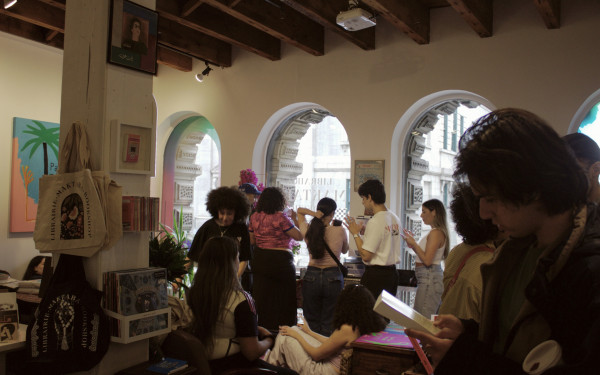The revolution lives in rent-free spaces
A Martin Luther King Jr. student and a creative strategist come together to better communities
Charles A. Black has witnessed first hand the transformative power of collective community action.
One of the last living students of Martin Luther King Jr., a working actor for the past 30 years and a long-time activist, Black continues to bring activism to the forefront. He challenges systems of oppression and advocates for community empowerment. However, according to Black, creating a successful movement takes effort and time.
“It's a matter of organizing and helping people to see the power that they have themselves, and applying that power for their own betterment,” Black said.
Inspired by King’s teachings and his philosophy of nonviolence, Black believes that people must challenge the current political and social system to create long-lasting change.
In the early 1960s, Black was the head of the Atlanta Student Movement, and he highlighted the importance of holding institutions accountable. The student movement was instrumental in fighting for civil rights as they staged marches, pickets and sit-ins. Members boycotted establishments that discriminated against Black people, refusing to let racist institutions use their money.
“We should not finance our own oppression. Withdraw your patronage,” Black said, regarding the purpose of divestment.
As an actor himself, Black believes that artists should be properly supported. With the current cost of living crisis, many people, especially artists, are unable to afford housing on the island of Montreal.
According to the Conseil des arts de Montréal, the average employment income for an artist in 2020 was $17,400 a year or $1,450 per month. The average rent for a one-bedroom apartment in Montreal in 2024 was $1,423.
The need to confront the housing crisis is at the epicentre of the Rent Free Coalition and its La Renaissance project. The coalition is a partnership between artists and social and cultural entrepreneurs from Montreal, Atlanta and New York. They have come together in the hopes of finding innovative solutions to housing injustice.

By placing artists and cultural entrepreneurs at the centre of real estate innovation, the coalition aims to find and create permanently affordable housing for everyone. La Renaissance is inspired by transformative cultural movements like the Harlem Renaissance of the 1920s, which combined culture and real estate.
As the co-founder and chairman of the La Renaissance project, Black seeks to extend that philosophy to Montreal’s political landscape.
The La Renaissance project is not one that Black is tackling alone.
Marie-France Barbier is the co-founder of the Rent Free Coalition and a creative strategist. Barbier and Black first met in early 2024 through a mutual acquaintance. Black has since become a mentor to Barbier.
As a first-generation immigrant, real estate agent and cultural worker for the past 20 years, Barbier highlights the importance of integrating culture and community into urban development.
“Culture is our biggest capital,” Barbier said. “In order to benefit from our culture, we need to have our spaces.”
During the Harlem Renaissance, African Americans threw rent parties filled with music and soul food to collect money to pay their rent. The Black community came together to help each other as landlords were raising prices at an incredible rate.
The Rent Free Coalition wants to create a similar impact by bringing people together. The goal is not just to provide shelter; it is also to create spaces that foster creativity and collaboration. The coalition’s statement underscores that artists need a place to thrive without the constant pressure of increasing rent.
Barbier believes that rest is a core value of the coalition. She explains that it is important to the well-being and health of people, and that making adequate and affordable housing is a simple human right.
The Canadian Human Rights Commission declares that adequate housing must be secure, affordable and habitable, and include basic services such as clean water. It adds that housing should include heating and be accessible, safe and culturally appropriate, allowing people to rest, recharge and contribute fully to society.
“We should not finance our own oppression. Withdraw your patronage.” — Charles A. Black
The coalition is not using new tactics, Barbier says, but they are using a different strategy by allowing the ones impacted by the issue to have their word on how it will be solved. La Renaissance embodies the need for change; Barbier describes it as “a transnational social innovation initiative rooted in a culture, care and collective dreaming.”
The project includes not only artists but also other essential workers like nurses and firefighters. It revolves around a new housing concept called La Restoration that would allow people to access different modalities under one roof—such as a community rest space and artistic third spaces—changing urban rest into urban wealth.
“Wealth means belonging to a village and community, a family,” Barbier said.
Among those supporting the La Renaissance project is Sonny Moroz, city councillor for Snowdon. As an elected official, Moroz is deeply aware of the rising issues with affordability and the impact it has had on various people. He fell in love with helping his community as a young adult and has kept doing so ever since.
Moroz believes that the government must continue to fund the building of homes and apartments. In May 2024, Montreal's mayor, Valérie Plante, promised to build 120,000 homes over the course of 10 years, including 25,000 homes by 2026. In a 2023 annual report by the Canadian Mortgage and Housing Corporation, Montreal built 68 per cent fewer homes than it did in 2022.
Moroz criticizes this phenomenon as false promises from politicians and the struggle to obtain the correct development permits. The Rent Free Coalition is a chance to establish new and fresh solutions, according to Moroz.
“To innovate, you need to fail in order to succeed better, and that takes an entrepreneurial mindset,” Moroz said.
For Black, the housing crisis in Montreal affects everyone. He believes that while the path to affordable and secure housing may be long, changes happens one step at a time
“[We need a Montreal] where we collectively decide, as a society, to fight for the most vulnerable, together,” Barbier said.
This article originally appeared in Volume 45, Issue 12, published April 1, 2025.







_600_375_90_s_c1.JPG)